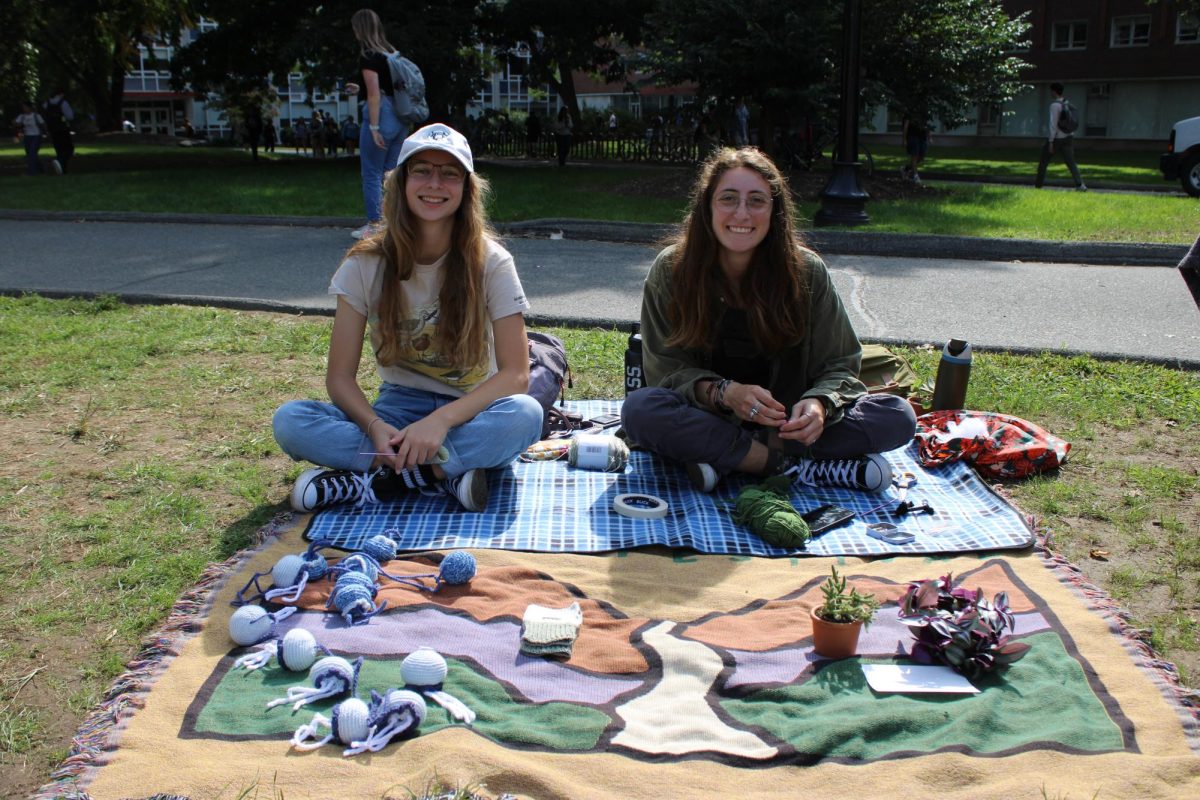The University of Massachusetts Student Farmers Market returned to Goodell Lawn on Sept. 8. A collaboration between UMass Permaculture Club and the UMass Student Farm, the event creates a space for student artists and farmers to connect.
“It’s more like community as compared to competition,” Samantha Belculfine, a senior microbiology major said.
Belculfine, along with two friends, sells crochet projects, such as pumpkins, frogs and her favorite, plants.
“There are other artists here, but we all have our own specialty and we all focus on our own separate thing,” Belculfine said.
Charles Townsend, a junior English major, specializes in quill pens. Using stray feathers his friend collects from her pet macaw and peacocks she cared for at a zoo, Townsend sharpens and ties them into the old-fashioned writing tool. Townsend crafted his first quill pen after a turkey feather in a store caught his eye.
“I’ve got turkey feather pens, I’ve got pheasant pens, I’ve got macaw and peacock, and people love it,” Townsend said. Next, he plans to sell handmade leather journals.
Unlike newcomer Townsend, Caroline Ball, a senior sociology and dance major, returned for their fourth year at the farmers market selling crochet octopi. For Ball, seeing students with the octopi keychains bobbling on their backpacks and other students’ art brings them back each year.
“I think it’s a good place to foster community especially on such a big campus, and for artists to be able to come together and for clubs and co-ops like Earth Foods and WMUA [radio],” Ball said.
For students looking to fill their fridge with fresh veggies, the UMass student farm also runs a booth. Chris Gates, a junior sustainable food and farming major, said student farmers grew and harvested all the food for sale at farms in South Deerfield and on North Pleasant Street.
“I enjoy seeing students come by and get fresh, organic produce. It feels good to be able to give people something like that,” Gates said.
Gates appreciates that the event is more than a traditional farmers market.
“There’s us, permaculture, and a microgreen stand over there that are the only ones selling farmers market products…It’s cool to be able to have students run their own little businesses. Everyone comes out here, talks to each other, connects, and gets outside,” Gates said.
Next to the farm booth, Chase Dennie, a sophomore sustainable food and farming major, sold handmade moccasins, leather bound pouches and lighter holders made of leftover material from industrial era factories.
“I use a nail to poke a hole into the hide, and then I use leather lace to throw it all through, so it’s all 100% leather,” Dennie said.
Senior marketing and event management major, Emma LaCava transforms everyday objects like thrifted glassware and records into art as her creative outlet.
“It’s just a little side hustle that keeps visual art in my life because I’m not an art major, I’m a business management major,” LaCava said. LaCava held up a vase she thrifted from the farmers market last year, except now, painted purple lavender sprigs decorated the glass. “Sometimes you get a specific piece and you’re like, ‘This is what it needs to be.’”
Like many vendors, the people are what brings LaCava to the farmers market every Friday.
“I always sell better in person because I just like talking to people. I sell on Instagram too, but it’s not the same,” she said. “It’s a really cool way for people to meet each other, artists to meet each other,” LaCava said.
Within a world of mass production, both LaCava and Townsend said they appreciated that farmers market vendors are individuals creating materials connected to the region and the people within it.
“Everyone’s very small; there’s no big companies setting up… None of this for us is our full-time jobs,” LaCava said.
“You can still buy… and appreciate the things you use, that way you can have something truly unique in a world where such few things are truly unique,” Townsend said.
Eve Neumann can be reached at [email protected] and Aalianna Marietta can be reached at [email protected].



















